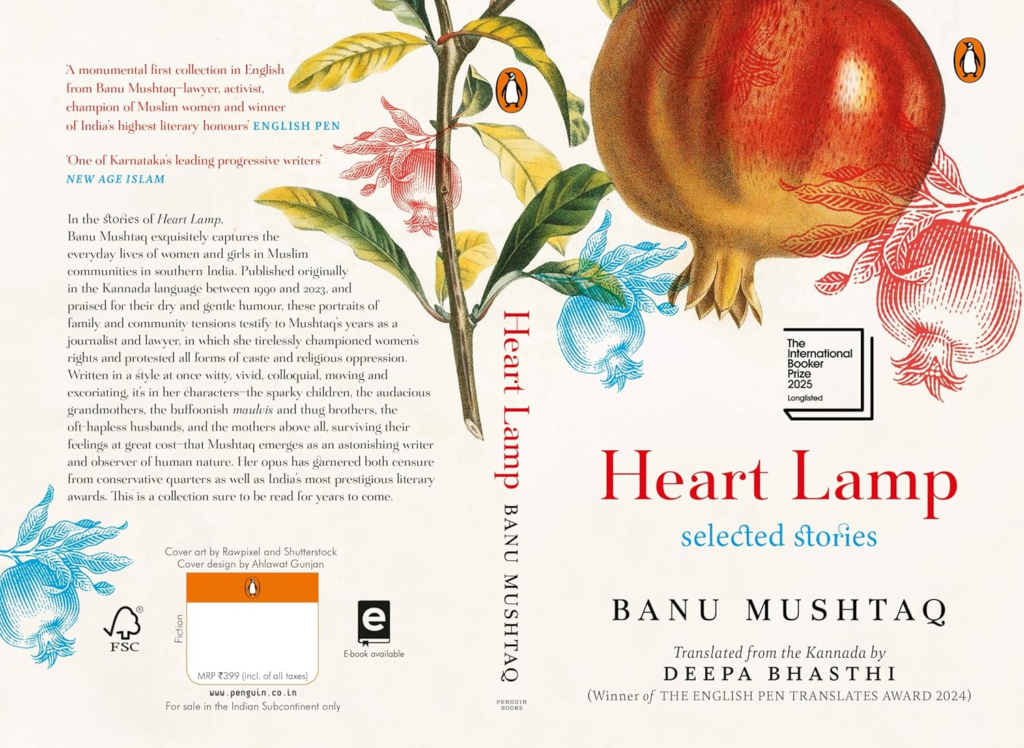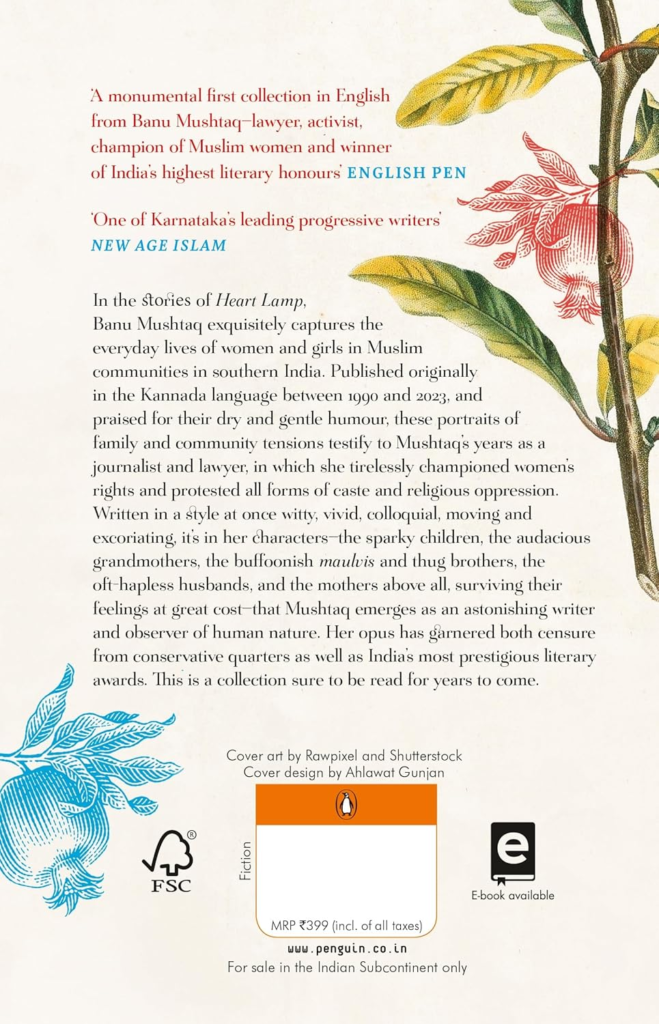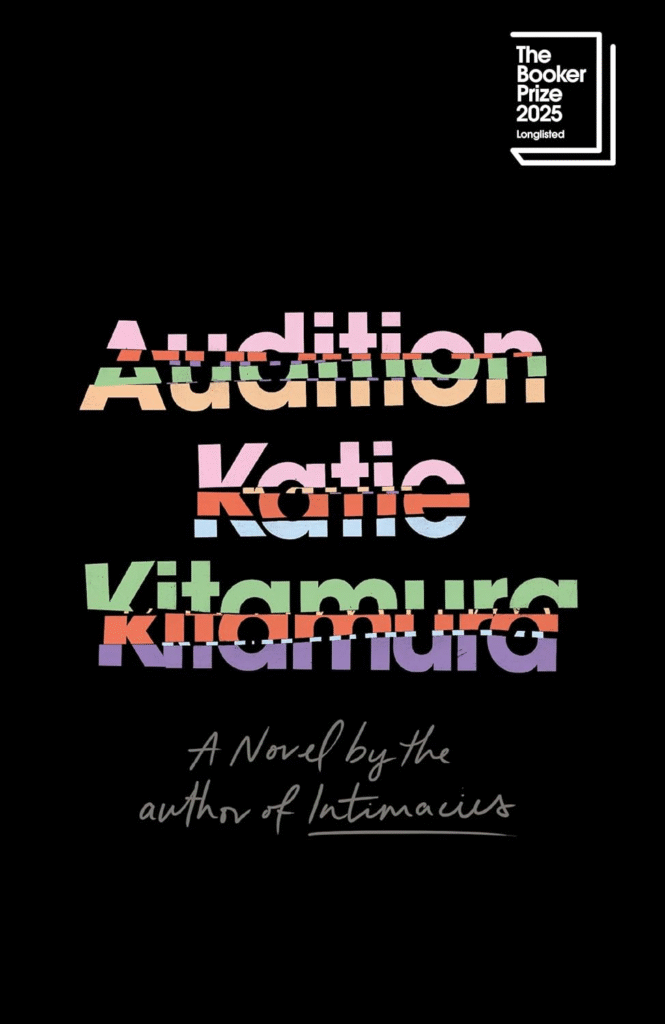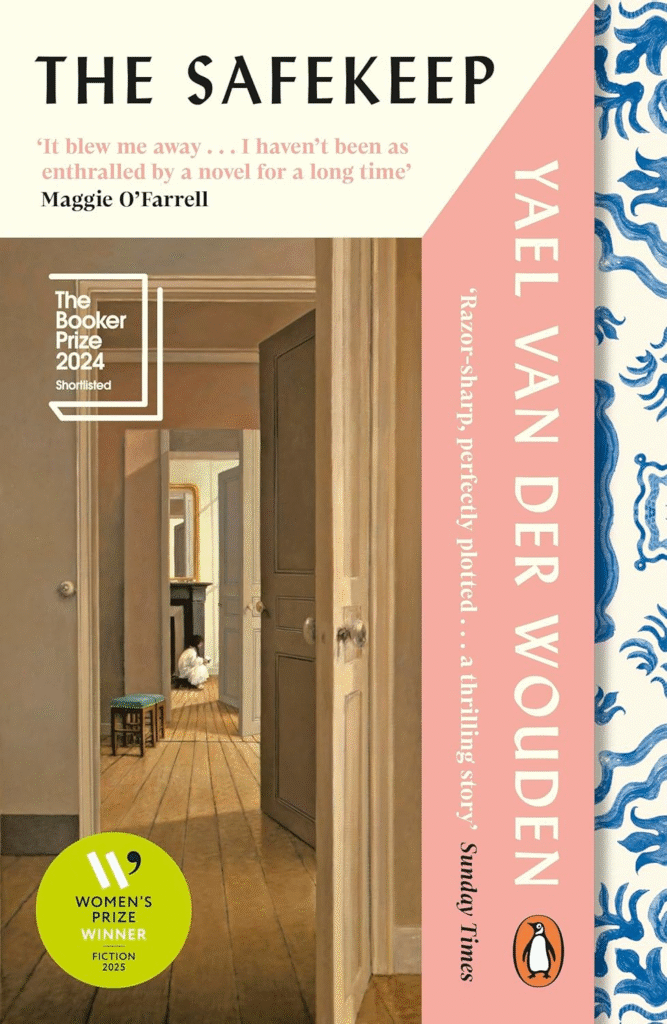Heart Lamp: Selected Stories, the 2025 winner of the International Booker Prize, is a powerful and deeply human collection of stories that shines a light on the lives of Muslim women and girls in southern India. Written by Banu Mushtaq and originally published in Kannada, Heart Lamp presents 12 short stories that vividly portray the inner and outer lives of women exploring complex family dynamics, social norms, and deep-rooted cultural structures. Translated beautifully by Deepa Bhasthi, Heart Lamp brings to life characters that feel incredibly real, with their emotions, struggles, and hopes expressed in a language that is simple, spoken, and emotionally rich. It is the first book written in Kannada, and only the second from both India and South Asia, to win the prestigious award, which honours translated works of fiction published in the UK and Ireland.

What makes Heart Lamp so compelling is not just the themes it explores – such as faith, caste, reproductive rights, and oppression – but the way it does so with honesty, humour, and depth. Mushtaq draws from her experiences as a journalist and lawyer to craft stories that are both sensitive and courageous. Through Heart Lamp, readers are offered a glimpse into communities that are often ignored or stereotyped, making it a must-read for those who wish to see the everyday beauty and pain in the lives of ordinary people, especially women.
Reading Heart Lamp feels like meeting a series of unforgettable people spirited children, wise yet worn grandmothers, flawed men, and mothers silently enduring. Each character is shaped by love, fear, societal pressure, and quiet resilience. The storytelling style is refreshing witty, moving, colloquial, and bold and the translation manages to retain the soul of the original Kannada. These stories, written over three decades (1990–2023), retain a strong local flavour while speaking universal truths, showing that no matter where we come from, the core of human emotions remains the same.
Heart Lamp is not just a literary achievement, but also a socio-political statement. It challenges narrow views and invites empathy. In times when communities are being pushed into silos, this collection is a timely reminder that our joys and sorrows often echo each other, regardless of language or religion. The book rightly deserves its place among modern classics, and readers will likely find themselves returning to these stories time and again.
Read Also: Book Review: Freedom in Exile by Dalai Lama
Availability and Purchase Details

Heart Lamp: Selected Stories by Banu Mushtaq, the WINNER of the International Booker Prize 2025, is published by India Penguin and available in English. The paperback edition, released on 15 April 2025, spans 224 pages and is priced at ₹315, while the Kindle edition is more affordable at ₹251 perfect for readers who prefer instant access and portability. The book can be purchased online through major retailers like Amazon India, Flipkart, and Penguin’s official website. Choosing Kindle not only saves money but also allows readers to start reading immediately on any device.
Read Also: Butter Chicken in Ludhiana by Pankaj Mishra Review
About the Author: Banu Mushtaq
Banu Mushtaq is a distinguished Indian writer, lawyer, and social activist from Hassan, Karnataka. Born on April 3, 1948, she has been a formidable voice in Kannada literature, particularly known for her advocacy of women’s rights and social justice. Her literary journey commenced in the 1970s and 80s within the Bandaya Sahitya (Rebel Literature) movement, a progressive literary circle in southwestern India that challenged societal norms and caste hierarchies. As one of the few women in this movement, Mushtaq’s writings critically examine the intersections of gender, caste, and religion.

Over the years, she has authored six short story collections, a novel, an essay collection, and a poetry collection, all in Kannada. Her works have been translated into multiple languages, including Urdu, Hindi, Tamil, Malayalam, and English, broadening her reach and impact. Mushtaq’s narratives often draw from her experiences as a lawyer and journalist, shedding light on the lived realities of Muslim women in southern India. Her commitment to social issues has not been without challenges; in 2000, she faced a fatwa for advocating women’s rights to pray in mosques. Despite such opposition, she remains steadfast in her mission to amplify marginalized voices.
Her acclaimed collection, Heart Lamp, which compiles stories written between 1990 and 2023, won the 2025 International Booker Prize, marking the first time a Kannada-language work received this honor. At 77, Mushtaq became the oldest recipient of the prize, further solidifying her legacy in global literature. Together, Banu Mushtaq and Deepa Bhasthi have not only brought Heart Lamp to an international audience but have also highlighted the richness of Kannada literature and the importance of translation in bridging cultural divides.
Read Also: The Fearless Judge Book Review: Justice Ahmadi’s Life
About the Translator: Deepa Bhasthi
Deepa Bhasthi is a renowned writer, journalist, and literary translator based in Kodagu, southern India. Born in 1983 in Madikeri, Karnataka, she pursued a degree in journalism from Mangalore University and has since contributed essays, columns, and cultural criticism to over forty national and international publications, including The Paris Review, The Guardian, The Hindu, and Literary Hub.
Deepa Bhasthi is a renowned writer, journalist, and literary translator based in Kodagu, southern India. Born in 1983 in Madikeri, Karnataka, she pursued a degree in journalism from Mangalore University and has since contributed essays, columns, and cultural criticism to over forty national and international publications, including The Paris Review, The Guardian, The Hindu, and Literary Hub.
Bhasthi’s translation work is notable for its depth and sensitivity, often focusing on bringing regional Indian literature to a broader audience. Her translations include works by Jnanapitha awardee Dr. Kota Shivarama Karanth and Kodagina Gouramma, one of the earliest feminist writers in Kannada. Her translation of Banu Mushtaq’s Heart Lamp not only introduced Mushtaq’s poignant stories to English readers but also earned her the English PEN Translates award.
Read Also: The Power of Buddhism Book Review & Insights
Key Themes Explored in Heart Lamp

Heart Lamp by Banu Mushtaq is a compelling collection of 12 short stories that delve into the lives of Muslim women in southern India. The book offers a poignant exploration of themes such as gender inequality, religious orthodoxy, and the resilience of women in patriarchal societies.
- The Everyday Heroism of Women: The title story of Heart Lamp is semi-autobiographical and portrays a woman on the verge of self-immolation. Her breakdown and breakthrough symbolizes the emotional resilience that women summon daily in the face of emotional suffocation and societal judgment.
- Gender Inequality and Women’s Agency: In Heart Lamp, Mushtaq portrays the systemic gender disparities that confine women to domestic roles, often denying them autonomy over their bodies and choices. Stories like “Stone Slabs for Shaista Mahal” highlight how women are expected to bear children continuously, with little regard for their health or desires. The narrative underscores the societal expectation that women must prioritize family honour over personal well-being, reflecting the pervasive nature of gender inequality in these communities.
- Romantic Idealism vs. Cruel Reality: The story Stone Slabs for Shaista Mahal in Heart Lamp opens with Iftikhar’s deep love for his wife, Shaista, dreaming of a Taj Mahal-like tribute. But his sudden remarriage just forty days after her death reveals the fragile, often performative nature of male love. The story underscores how romanticism can mask deeply rooted patriarchal entitlement.
- The Weight of Honor and Familial Expectations: In Heart Lamp, Mushtaq delves into how concepts of honour and familial expectations disproportionately burden women. In the titular story, Mehrun seeks refuge from an abusive marriage, only to be chastised by her family for potentially tarnishing their honour. This narrative underscores the societal pressures that compel women to endure suffering to uphold family reputation.
- Male Prestige over Female Rights: This sharply ironic tale of Heart Lamp centres on a man who, in a bid to appear noble, denies his sister her legal share. The hypocrisy in the name of religion and reputation makes the story both humorous and disturbing.
- Emotional Loneliness Within Marriage: In this touching story of Heart Lamp narrative, the protagonist feels invisible in her marriage, reduced to a vessel for children and chores. The story delves into emotional neglect that many women endure behind closed doors, often unspoken and untreated.
- Subtle Acts of Resistance: The women in Heart Lamp often engage in quiet, everyday acts of defiance against patriarchal norms. For instance, in “Black Cobras,” Amina chooses to undergo a tubectomy without her husband’s consent, asserting control over her body. A woman fights for her child’s rights while her husband takes a second wife. It reveals how men, aided by opportunistic maulvis, manipulate religious law for convenience, pushing women to the margins in the name of faith. Such narratives highlight the nuanced ways women reclaim agency within restrictive environments.
- Intersection of Religion and Gender: Mushtaq critically examines how religious interpretations can perpetuate gender inequalities. In “Fire Rain,” a mutawalli denies his sister her rightful inheritance, manipulating religious doctrine to justify his actions. Heart Lamp thus sheds light on the misuse of religious authority to suppress women’s rights.
- The Complexity of Female Relationships: Heart Lamp explores the intricate dynamics among women, including rivalry, solidarity, and shared suffering. In “A Decision of the Heart,” familial tensions arise when a man decides to remarry his widowed mother, leading to conflicts with his wife. These stories reveal the multifaceted relationships that shape women’s experiences.
- The Role of Humor and Satire: While addressing serious issues, Heart Lamp employs humor and satire to critique societal norms. In “High-Heeled Shoe,” a pregnant woman is forced by her husband to wear ill-fitting stilettos, highlighting the absurdity of male dominance and vanity. Mushtaq uses wit to expose the absurdities of patriarchal practices, making her commentary both engaging and thought-provoking. This stylistic choice adds depth to the narratives, allowing readers to reflect on the underlying messages with both empathy and critical insight.
- Misinterpretation of Religious Doctrines: A recurring theme in Heart Lamp is the distortion of religious teachings to justify patriarchal practices. Mushtaq illustrates how religious texts are often manipulated by men to control women’s lives, as seen in stories where male characters use faith as a tool to legitimize polygamy or deny women their rightful inheritance. This critique sheds light on the misuse of religion to perpetuate gender-based oppression.
- Socioeconomic Struggles and Class Disparities: Heart Lamp also delves into the intersection of gender and class, portraying how economic hardships exacerbate the challenges faced by women. In “Red Lungi,” for instance, the protagonist’s frustration with her domestic burdens leads to a mass circumcision event, reflecting the pressures of poverty and societal expectations. Mushtaq’s narratives reveal how financial constraints often limit women’s choices and amplify their struggles within the family and community. This story is one of the most satirical stories in Heart Lamp, mocks people who turn charity into self-serving theatre. A mutawalli’s inflated ego and performative piety expose how Islamic principles of quiet giving are often ignored to maintain social prestige.
- Female Solidarity and Resistance: Despite the oppressive environments depicted, Heart Lamp showcases moments of female solidarity and subtle resistance. Women in these stories often find strength in each other, challenging societal norms in quiet yet impactful ways. This theme emphasizes the resilience and agency of women who, even in the face of adversity, seek to assert their identities and support one another.
- The Complexity of Domestic Relationships: Mushtaq’s stories in Heart Lamp intricately explore domestic dynamics, revealing the emotional complexities within families. Characters grapple with love, betrayal, and the longing for recognition, as seen in narratives where women find relationships with indifferent or domineering husbands. These portrayals underscore the nuanced experiences of women striving for dignity and affection in their personal lives.
- The Impact of Translation: The English translation of Heart Lamp by Deepa Bhasthi plays a crucial role in conveying the cultural nuances and emotional depth of Mushtaq’s stories. It preserves the linguistic richness of the original Kannada text, incorporating regional idioms and expressions. This careful rendering ensures that the cultural nuances and emotional depth of Mushtaq’s stories resonate with a broader audience, maintaining the authenticity of the narratives. Bhasthi’s translation preserves the original’s colloquial tone and regional flavor, making the narratives accessible to a broader audience while maintaining their authenticity. This effort highlights the importance of translation in bringing regional literature to the global stage.
Heart Lamp stands as a significant literary work that offers a window into the lives of marginalized women, challenging readers to confront uncomfortable truths about gender, religion, and societal structures. Through its rich storytelling and critical themes, the collection not only illuminates the struggles of its characters but also invites broader discussions on equity and justice.
Read Also: Devi: Gripping Kolkata Crime Thriller by Prasun Roy
Why You Should Read Heart Lamp

Heart Lamp is not just a book instead it is a powerful experience that opens your eyes to the struggles and strength of women from Southern India’s Muslim communities. This award-winning collection of 12 short stories, written by Banu Mushtaq over three decades and beautifully translated by Deepa Bhasthi, gives voice to the unheard and challenges long-held assumptions. According to Max Porter, Chair of the 2025 International Booker Prize judges, it is “something genuinely new for English readers” a bold, radical translation that redefines how language can express emotion, power, and culture. The stories are not only life-affirming but are also rich with the complex layers of caste, religion, gender, and power.
Banu Mushtaq, a lawyer, journalist, and fierce advocate for women’s rights, writes with clarity and empathy, exposing how religion is sometimes misused to control rather than uplift. The stories may make you laugh, cry, or reflect, but they all stay with you. From tales of maternal sacrifice to battles over inheritance, every narrative reveals raw, honest moments in everyday lives. Fiammetta Rocco, Administrator of the prize, urges both men and women across the globe to read this book, highlighting its timely message and its ability to speak for those often silenced. With translation that maintains the original beauty and rhythm of Kannada, Heart Lamp delivers not just stories, but a deep, universal truth. It is the first Kannada book and only the second from India or South Asia to win the prestigious International Booker Prize, proving its literary excellence. Whether you are a casual reader, a student, or a seeker of social truths, this book deserves a place on your shelf and in your heart.
Final Thought
Heart Lamp is not just a book it is an urgent, necessary mirror held up to society, reflecting stories that have long been silenced or misunderstood. Through its vivid characters, emotional honesty, and fearless critique of injustice, this collection compels readers to listen, reflect, and respond. Whether you are looking to understand the lived realities of women in Southern India, or seeking powerful storytelling that resonates universally, this book delivers it all.
Fiammetta Rocco, Administrator of the International Booker Prize, perfectly summarizes its importance:
“Heart Lamp, stories written by a great advocate of women’s rights over three decades and translated with sympathy and ingenuity, should be read by men and women all over the world. The book speaks to our times, and to the ways in which many are silenced.”




